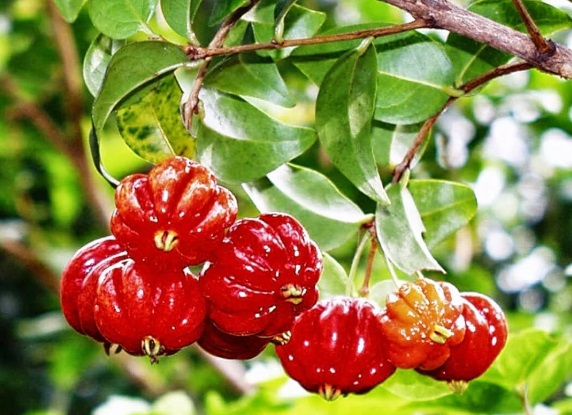Scientists in Portugal Discover That Phytochemicals in Eugenia Uniflora Can Help Prevent and Treat Cardiovascular Diseases
Nikhil Prasad Fact checked by:Thailand Medical News Team Jan 23, 2025 2 months, 3 weeks, 5 days, 7 hours, 54 minutes ago
Medical News: Cardiovascular diseases (CVDs) are a leading cause of death worldwide, claiming millions of lives annually. In a groundbreaking study, researchers in Portugal have unveiled promising findings regarding the use of Eugenia uniflora - commonly known as Surinam cherry or pitanga - as a natural remedy for preventing and managing these diseases. This revelation offers a ray of hope for those battling heart-related ailments.
 Scientists in Portugal Discover That Phytochemicals in Eugenia Uniflora Can Help Prevent and Treat Cardiovascular Diseases
Scientists in Portugal Discover That Phytochemicals in Eugenia Uniflora Can Help Prevent and Treat Cardiovascular Diseases
The study, conducted by scientists from the Centro de Química da Madeira (CQM) at the University of Madeira, Portugal, sheds light on the powerful phytochemicals present in Eugenia uniflora fruits and leaves. These bioactive compounds, known for their antioxidant, anti-inflammatory, and antihypertensive properties, were extensively analyzed to determine their role in combating cardiovascular conditions. This
Medical News report delves into the details of the study and its implications for human health.
Exploring the Power of Eugenia Uniflora
Eugenia uniflora, a small tropical fruit native to Brazil, has long been recognized in traditional medicine for its numerous health benefits. The study focused on two varieties of the fruit - orange and purple pitanga - as well as the leaves of the plant. Using state-of-the-art techniques such as UHPLC-PDA (Ultra-High Performance Liquid Chromatography with Photodiode Array Detection), the researchers identified and quantified the polyphenolic compounds in these samples.
Among the key findings was the identification of gallic acid, a potent antioxidant, as the dominant polyphenol. The orange variety of Eugenia uniflora boasted the highest concentration of gallic acid at 13.1 mg/100 g dry weight (DW). These results highlight the fruit's potential as a natural source of antioxidants, which can neutralize harmful free radicals in the body, reducing oxidative stress - a major factor in the development of CVDs.
Antioxidant, Anti-Inflammatory, and Antihypertensive Properties
The researchers employed several assays to evaluate the biological activities of the Eugenia uniflora extracts. These included the DPPH and ABTS assays for antioxidant activity, an ACE inhibition assay for antihypertensive potential, and a protein denaturation inhibition test for anti-inflammatory properties.
-Antioxidant Activity: The purple pitanga variety exhibited slightly higher antioxidant activity than its orange counterpart in most assays, though both demonstrated significant potential. The leaves, however, showed lower antioxidant activity, suggesting that the fruits are the more potent source of health-promoting compounds.
-Anti-Inflammatory Activity: Inflammation plays a critical role in the progression of cardiovascular diseases. The study revealed that both orange and purple pitanga extracts had strong anti-inflammatory effects,
with the orange variety showing an inhibition rate of 82.5%, comparable to that of the purple variety at 81.7%. These findings suggest that consuming Eugenia uniflora could help reduce systemic inflammation and protect the cardiovascular system.
-Antihypertensive Potential: High blood pressure is a major risk factor for heart disease. The study demonstrated that Eugenia uniflora extracts effectively inhibited the angiotensin-converting enzyme (ACE), which plays a role in regulating blood pressure. The purple variety achieved a 46.9% inhibition rate, while the orange variety reached 42.6%. Although these rates were slightly lower than those of conventional ACE inhibitors like captopril, they underscore the plant's potential as a natural alternative.
Key Implications and Future Applications
The findings of this study emphasize the potential of Eugenia uniflora as a natural therapeutic agent for cardiovascular health. Its rich polyphenol content, coupled with its antioxidant, anti-inflammatory, and antihypertensive properties, positions it as a valuable addition to functional foods, nutraceuticals, and pharmaceuticals.
Moreover, the use of natural products like Eugenia uniflora aligns with global trends toward plant-based remedies that are both sustainable and free from the side effects often associated with synthetic drugs. The researchers suggest that further studies could explore the synergistic effects of combining Eugenia uniflora extracts with other plant-based compounds for enhanced efficacy.
Conclusion
The research conducted by the team at the University of Madeira highlights the remarkable potential of Eugenia uniflora in preventing and managing cardiovascular diseases. By harnessing the power of nature, scientists are paving the way for innovative, sustainable solutions to one of the world's most pressing health challenges.
These findings are a testament to the growing importance of phytochemicals in modern medicine. With further research and development, Eugenia uniflora could become a cornerstone of preventive healthcare, offering hope to millions of individuals at risk of cardiovascular diseases.
The study findings were published in the peer-reviewed journal: Life.
https://www.mdpi.com/2075-1729/15/2/147
For the latest on Herbs and Phytochemicals, keep on logging to Thailand
Medical News.
Read Also:
https://www.thailandmedical.news/news/bulgarian-study-highlights-benefits-of-black-chokeberry-juice-for-heart-health
https://www.thailandmedical.news/news/medicinal-mushroom-discovery-may-aid-heart-health
https://www.thailandmedical.news/news/taiwanese-study-reveals-heart-health-benefits-of-the-phytochemical-momordicine-i-from-bitter-melon
https://www.thailandmedical.news/news/astragalus-injection-offers-hope-for-treating-viral-myocarditis
https://www.thailandmedical.news/news/herbs-and-phytochemicals-ilex-pubescens-protects-heart-after-myocardial-infarction
https://www.thailandmedical.news/articles/herbs-and-phytochemicals
